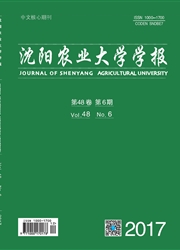

 中文摘要:
中文摘要:
研究了番茄(Lycopersicon esculentum Mill.)经过夜间不同亚低温处理后,苗期净光合速率和生长发育的变化。结果表明:苗期夜间不同亚低温(25/12℃,25/9℃,25/6℃)处理降低了番茄植株的净光合速率(Pn)。导致生物积累量减少,温度越低,对植株的影响越大。Pn在恢复期的第1天就迅速恢复到对照水平,第3天显著高于对照的Pn;亚低温对叶片叶绿素含量影响不大,但严重影响植株的干物质质量分配:降低了根、茎的于物质积累,增加了叶的干物质积累,并在恢复期保持了这种分配关系;9℃和6℃处理与对照相比较,总干物质降低,恢复期总于物质积累差异呈加大的趋势;亚低温处理对株高生长的影响要大于对茎粗生长的影响。
 英文摘要:
英文摘要:
The change of photosynthesis and growth of tomato (Lycopersicon esculentum Mill. )after night sub-low temperature was studied. Results showed that night sub-temperature(25/12℃,25/9℃,25/6℃)decreased the net photosynthesis(Pn) and biomass. The Pn was recovered rapidly to the level of control at first day, and remarkably higher than controls at third day in recovery. The chlorophyll content of leaf was not impacted too much by the sub-low temperature, but dry matter distribution of plant was affected evidently, less distribution of dry matter in roots and stems but more in the leaves. And this distributing relationship was kept during the whole recovery course. Compared to the control plant, accumulation of total dry matter was decreased, and this difference tended to increase in 9℃ and 6℃ respectively. Plant height growth was more affected by sub-low temperature than stem diameter growth.
 同期刊论文项目
同期刊论文项目
 同项目期刊论文
同项目期刊论文
 期刊信息
期刊信息
